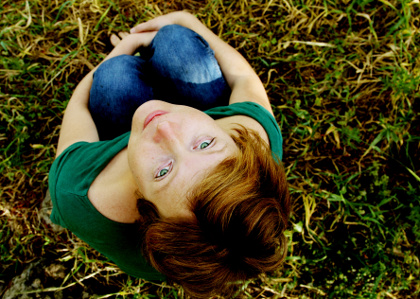Woman Interrupted: Lost and Found
I had always felt abandoned by my mother but felt quite matter of fact and intellectual about it all, as if “Well, too bad, that’s just what happened in my life.” But in reality it had a huge impact on me.
In that first session, there was this enormous physical feeling rising up within my chest, and it was quite overpowering and I became really emotional. I got lots of goose pimples and I cried for the first time ever about the situation.
I know it’s cliché, but it’s like I just had to get it off my chest. It just had to come out and it was quite amazing. I’m getting goose pimply now thinking about it, but it was really quite an incredible experience. Just in that initial response to the questions you asked and the therapy situation and seeing how it had actually really affected me. All my life I kind of took it, well I actually thought I was reacting okay to the situation, but obviously I wasn’t.
Background
I was sent to foster homes several times in my childhood, because my mother couldn’t care for me.

She had her own issues, because she lost her mom when she was quite young. So I think she just never really had any idea how to be a mom to me. As a child I didn’t understand all of this and it caused me a lot of pain. I am an adult now, but I think I have been carrying all of this inside me and there has really been no relief.
I am a mom myself and the way its’ affected me, is that my anxiety about my son is huge. I am so desperately unhappy about him. I get sick with worry when he is out. When I have to pick him after parties at 2am in the morning we fight. My problem is I am highly emotional, terribly emotional. I overreact and I can’t help myself.
It doesn’t help that I’m overweight. The way I feel about myself is I feel quite disturbed really about my own self, my body, how I look.
I know it is irrational, but I feel guilty when anything that happens in the world. My anxiety is so extreme that I have to rest, I need 12 hours of sleep to recuperate from each day. I have to go to bed really early, I just can’t stay awake.
I take everything personally, I am too hypersensitive and people disappoint me, my husband disappoints me. I walk around with an aching heart and it hurts our relationship, because I get angry and withdraw.
The stress is physical too. My neck was damaged and I have been battling chronic neck pain for years, I am constantly seeing therapists and doctors, but there is no improvement. It’s debilitating and depressing and I think it’s all through stress.
If I look at my whole life it’s like there is no area that is really working properly. My career is on hold. Because I used to paint, but then I just sort of wound up restoring other people’s work. I lost confidence in my own painting. .
Analysis by Sydney psychologist Anca Ramsden
Jeanine was still trapped in her infant symbiotic connection to her mother and this made her feel responsible for her mother.
Jeanine has emotional stress that goes all the way back to her childhood. Separation from her mother and father at an early age locked her permanently into heightened fear and insecurity. Her physical pain shows that she experienced traumatic stress, most likely the result of repeated separations from her mother. Traumatic experiences like these leave a lasting impact, causing insecurities to persist into adult life. It causes emotional development to become arrested, keeping the adult stuck in childlike emotions.

Jeanine’s unmet needs for bonding cause her to still feel angry with her mother, even as an adult. Still craving for nurturing from her mother is causing her to continuously feel disappointed in her mother and critical of her mother.
Jeanine also shows signs of being stuck in a state of guilt, which shows that some of her trauma took place between the ages of 4 to 6 years of age.
She is living permanently on high alert, expecting the worst. To become more balanced and regain her health and emotional well being, she needs to release the traumatic stresses of her childhood.
To understand what Jeanine is going through it is helpful to understand how stress works.
We have three basic survival reactions when we feel threatened. We can defend our selves with anger and aggression, and this response is called the fight response. Or we will be afraid and flee for safety, this is called the flight response. If fighting and fleeing don’t help us to overcome or avoid the threat we will freeze. In the freeze state we feel numb and paralyzed, unable to take action. This state serves the purpose of preparing us for dying. This when we have given in and given up all hope. This is also the state that is triggered when we experience traumatic stress, we feel overwhelmed and there is no escape.
Our stress reactions are already developed only a few weeks after we have been conceived. A six week old fetus can already respond to threats by withdrawing.
The important thing to know about stress is that the nervous system gets locked into a stress state very quickly, and once this has happened it can be difficult to reverse. This is why Jeanine is still stuck in high levels of stress even as an adult, though the actual threats from childhood no longer exist.
The area of the brain responsible for this heightened stress state is called the amygdala. To calm down the amyygdala a technique like Body-Mind Fractals is needed, because it works directly on our survival reflexes.
Jeanine was given physical exercises to calm down her amygdala, and she was also asked to contemplate her stress emotions, such as guilt and fear. These special combination of exercises. stimulated her nervous system to release old stress. The result was that Jeanine
was no longer stuck in a stress state and she could experience genuine happiness for the first time ever.
The transformation
When Jeanine released her fears and grief, her energy came back and she was able to get exercise and get to a better body weight. She needed less sleep and in her spare time took up her painting again. She matured emotionally and no longer projected her infant needs for
bonding onto her mom. This took the pressure off their relationship and it started to flourish.
She reconnected with her mother on a more adult basis, without the anger and high expectations.

This how she describes the transformation in her life:
Although my mother is an alcoholic she doesn’t drink so much now. In the past I used to get quite angry with her for drinking. I used think that it was my fault as well, but now I just see that’s her destiny; whatever she does, she has put herself in that situation and I can’t really do anything but to support her. I respect her now and I feel much more compassionate towards her as well. That’s helped me too. We get along a lot better, we see each other all the time. I like to be in her company, so we have a good healthy relationship now rather than one of feeling that I’m blaming her or being angry or sort of not knowing why I felt the way I felt. She notices it as well.



Leave a Reply
Want to join the discussion?Feel free to contribute!